Are dental crowns durable? Can dental crowns last forever? Or will they get damaged after years?” are common concerns regarding the durability of cosmetic dental crowns that many people are interested in. These questions are essential when considering investing a significant amount of money in cosmetic dental crowns. In this article, Bedental will provide you with more detailed information about the durability of dental crowns and ways to increase the lifespan of porcelain crowns.
What are cosmetic dental crowns?
What are cosmetic dental crowns? Before knowing if dental crowns are durable, you need to have complete information about dental crowns and the dental process to have the most accurate conclusion.
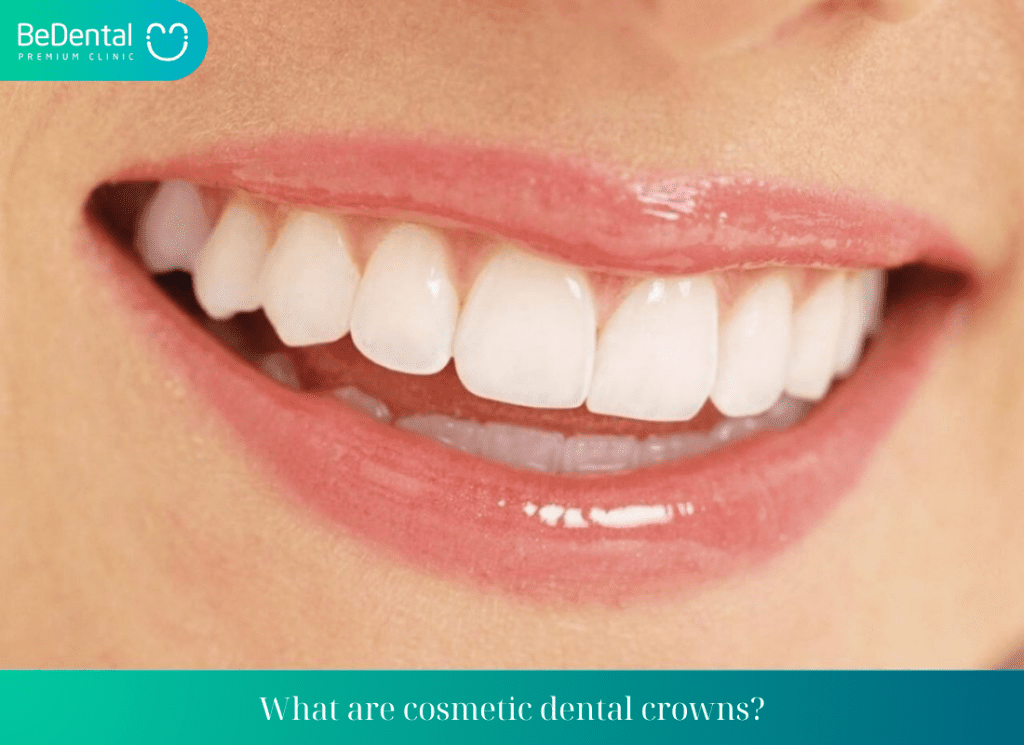
Dental crowns are the most common cosmetic treatment and functional restoration for teeth today. In dentistry, a dentist will use a layer of porcelain material that resembles the shape and color of natural teeth to cover the existing tooth.
See more: Signs of exposed porcelain teeth
Cases where you may need cosmetic dental crowns:
- Cracked, chipped, fractured, crooked, or broken teeth
- Teeth with enamel erosion, discoloration due to Tetracycline, severe irreversible discoloration, or inability to be whitened
- Teeth with unattractive appearance (moderate staining)
- Teeth damaged by moderate levels of tooth decay
Are dental crowns durable?
If the dentist follows the correct procedure for dental crown placement recommended by the manufacturer and takes proper care, cosmetic dental crowns can last approximately 7-15 years depending on the type of dental crowns.
The main advantage of dental crowns is that their color does not change over time. Therefore, you can use them with confidence without worrying about the color of your teeth changing over time.
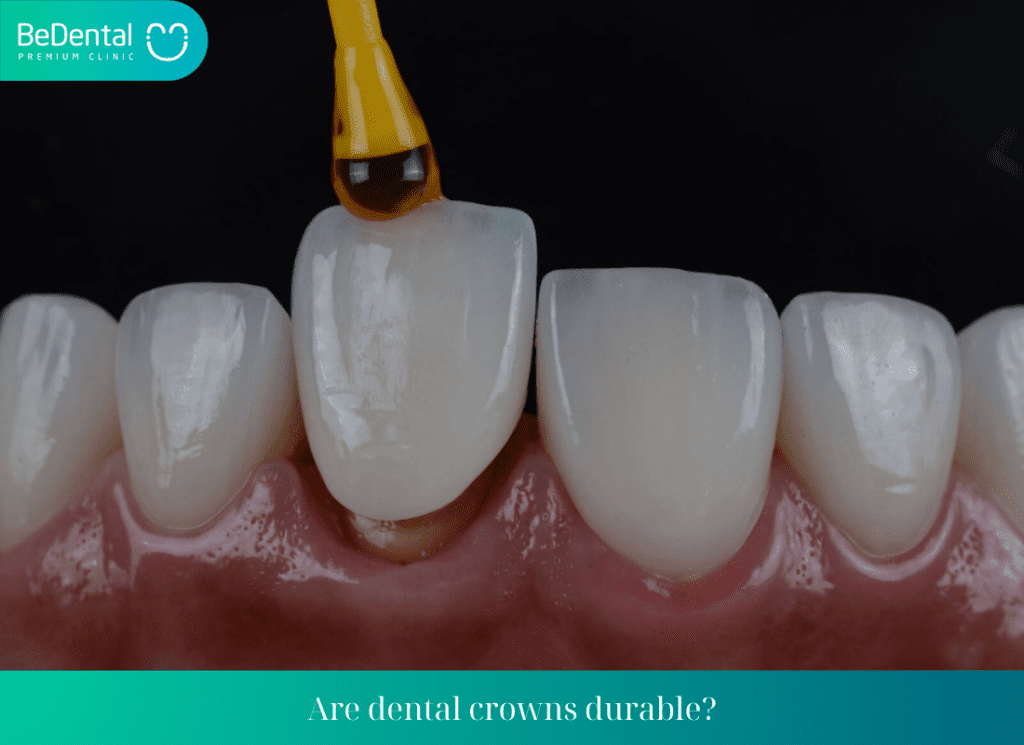
In addition, porcelain dental crowns have a color closely resembling natural teeth. Therefore, to an outside observer, it may be difficult to distinguish between natural teeth and dental crowns. Their types of porcelain crowns are also considered by many cosmetic dentists to be durable and beautiful.
However, the durability of cosmetic dental crowns depends on the following basic factors:
The type of cosmetic dental crowns you choose
There are many types of dental crowns available on the market with various uses, but typically dental crowns are divided into two main types:
Metal/titanium porcelain crowns
Metal or titanium porcelain crowns are also known as metal porcelain crowns. Are metal porcelain crowns durable? Metal porcelain crowns consist of a metal/titanium layer inside and a porcelain layer outside. Due to this structure, metal porcelain crowns do not have the same natural white color as real teeth.
Additionally, the metal framework inside the porcelain layer may detach from the gums due to oxidation of the metal framework and acidic environment in the mouth from improper brushing practices.
This can lead to black gums and decreased aesthetics of the teeth after approximately 5-6 years of use. Therefore, metal or titanium porcelain crowns are still used by many dentists to limit the loss of aesthetics and the need for surgical replacement.
All-ceramic porcelain crowns
These crowns are made entirely of pure porcelain, from the inner core to the outer layer. Therefore, all-ceramic crowns can overcome the limitations of metal porcelain crowns.
While the cost of all-ceramic crowns may be slightly higher, you can have full confidence in their quality and durability. All-ceramic crowns can have a maximum lifespan of 20 years or even longer with proper dental care.
Therefore, for both aesthetic reasons and durability concerns, you should choose all-ceramic crowns for your treatment.
Oral Care
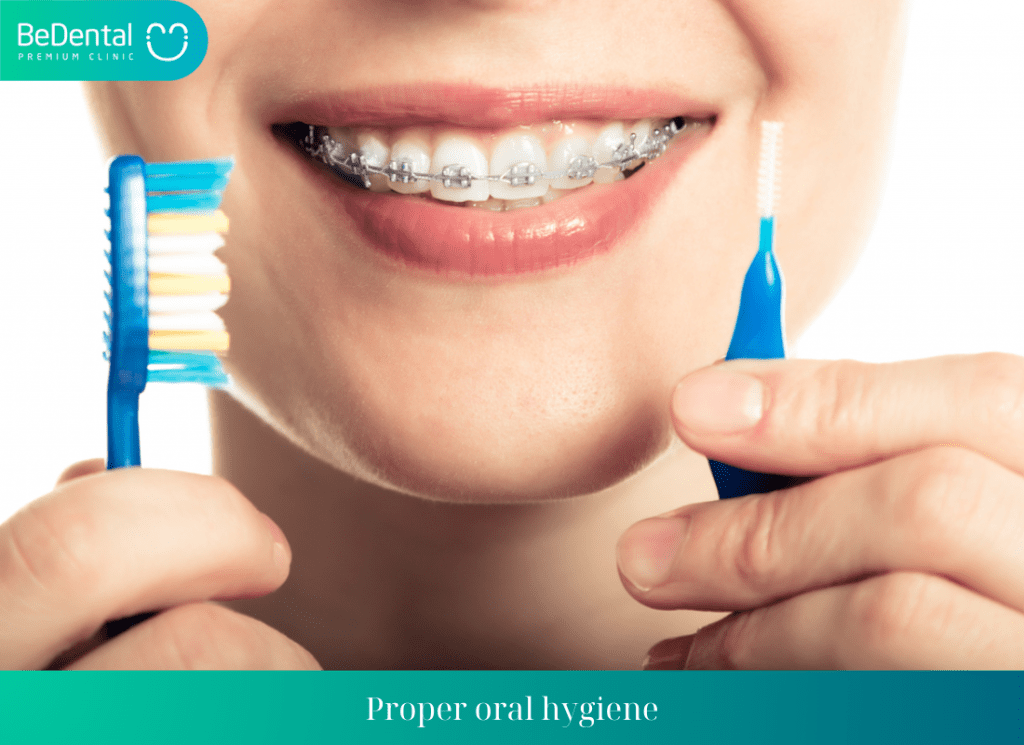
The durability of dental crowns largely depends on the daily oral care routine. Brushing your teeth too vigorously can cause the surface of porcelain crowns to peel off. Especially with metal crowns, the internal framework may quickly become exposed.
You can also use dental floss, dental cotton, mouthwash, etc., to naturally whiten your teeth and reduce the negative effects of brushing with a toothbrush.
Additionally, you should limit consuming hard, tough, soft, or hot foods and avoid chewing on hard objects with your crowns. These practices can help preserve the durability of dental crowns.
Tooth quality
The durability of porcelain dental crowns or the care methods for them depends on the quality of the teeth. Typically, when getting porcelain crowns, a dentist will grind down the teeth. In general dentistry, the entire enamel layer of the teeth is usually ground down and replaced with porcelain crowns.
See more: Can a broken denture be repaired?
Therefore, the dentist’s skill in grinding down the teeth will determine the durability of the porcelain crowns according to certain standards. Over-grinding can cause irritation to the tooth pulp during use. Grinding too thin can make the surface of the porcelain crowns unattractive and may cause joint pain after getting new crowns.
Therefore, if the teeth are strong and are being covered with porcelain crowns without requiring root canal treatment, they will have durability equivalent to natural teeth. For teeth that have had root canal treatments and are covered with porcelain crowns, the lifespan of the teeth will decrease over time. This is because the tooth pulp is the life source of the teeth, so root canal treatments can make the teeth brittle and prone to breakage over time.
Position of the teeth needing crowns
The position of the teeth is also affected by the chewing force. Typically, the upper teeth are more affected by chewing force, so their lifespan will decrease more compared to lower teeth.
Amount of tooth tissue
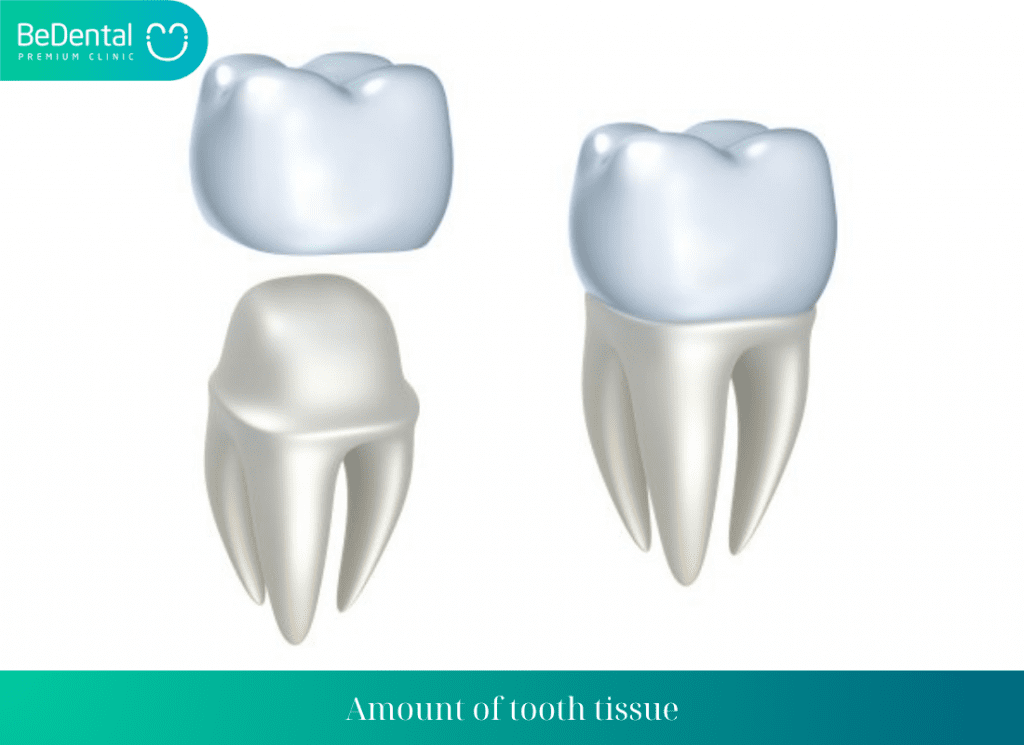
Teeth that have suffered significant trauma resulting in large fractures or multiple cavities have little tooth tissue left.
Therefore, the lifespan of the tooth crowns decreases. In many cases where there is significant tooth tissue loss, frameworks or metal crowns are used to increase strength and durability when covering with porcelain crowns. Therefore, the number of crowns needed depends on the above factors.
Professional expertise and skills of the performing dentist
All the factors mentioned above are significantly affected by the skills, experience, and professionalism of the dentist performing the procedure. Therefore, if you choose a reputable dental clinic and a highly skilled dentist, you won’t have to worry about the factors mentioned above, and you can be confident that getting porcelain crowns is safe!
Conversely, if you entrust your dental care to a dentist with limited experience and expertise, your dental health may be significantly affected despite potential cosmetic improvements.
Are porcelain crowns good? What are the advantages of porcelain crowns?
Are porcelain crowns good? Thanks to their many outstanding advantages in perfecting dental imperfections, porcelain crowns are becoming increasingly popular and one of the hottest beauty trends today. Are porcelain crowns good? The definite answer is “YES.” The following four advantages will provide the most understandable and accurate answer to the question.
Help achieve even and beautiful teeth
For uneven, misaligned, or crooked teeth, cosmetic porcelain crowns are an effective lifesaver. Dental braces are the most commonly used method because the time required for treatment is short, usually about 1 or 2 years.
The porcelain crown method is very suitable for adults or those who have ever undergone treatment but want to have evenly beautiful teeth without spending much time. Porcelain crowns will help you correct damaged parts of the teeth to make them white, even, and with a color similar to natural teeth.
Enhance dental aesthetics
If your teeth have been discolored due to severe bacterial infection and all whitening measures have failed, cosmetic porcelain crowns can help you overcome these dental imperfections. Your teeth will become whiter, evenly colored, and healthier. You can also choose the shine level of the porcelain crowns to best match your skin tone, making your teeth even and beautiful but still looking as bright as possible.
See more: What is tooth filling?
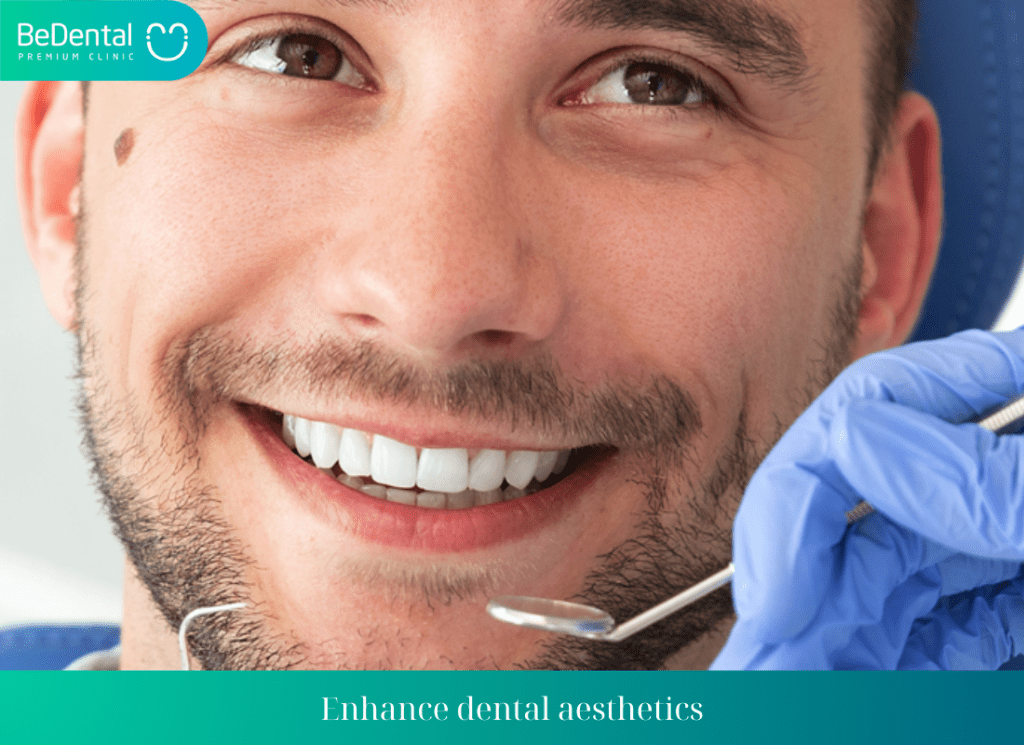
Porcelain crowns help protect teeth
For teeth that are diseased due to cavities or gum problems, treatment alone is not enough. In the oral environment, temperature and bacteria can cause diseases to flare up. Therefore, after curing the disease, getting porcelain crowns is also a method recommended by many dentists because it helps protect the teeth.
Teeth that are damaged by cavities, fractures, or strong impacts like biting, chewing food, and bacterial infections in the oral cavity. The broken or fractured teeth will be restored in shape, help protect the teeth, and significantly improve dental health.
The strength of porcelain crowns is not inferior to natural teeth
Natural teeth, if well protected, can last a lifetime. Porcelain crowns typically have a very high lifespan, averaging about 10 years for conventional metal crowns and over 20 years for non-metallic crowns (porcelain veneers). Even if well maintained and protected, porcelain crowns can last indefinitely.
Therefore, with a one-time cost, the teeth can be perfected in terms of aesthetics and health. You will truly feel confident conversing and socializing with others with the brightest smile.
See more: Stages of wearing braces
Disadvantages of porcelain crowns
When getting porcelain crowns, the sensitivity of the teeth is reduced slightly during eating, especially in the beginning when not used to it.
Teeth may become sensitive or painful, especially when chewing hard, tough foods, or experiencing frequent impacts.
During cosmetic porcelain crown placement, there may be cases of numbness or pain in the teeth, which also depend on various factors including the dentist’s expertise, the technique of placing the crowns, and each individual’s dental conditions.
For these individuals, besides the aesthetic requirements, while grinding the teeth, it may touch the dental pulp, necessitating root canal treatment, which may not benefit the teeth.
Are porcelain crowns permanent?
Are porcelain crowns permanent? Like many other materials, porcelain crowns will eventually wear out. Porcelain crowns can typically last an average of 7-15 years and may even extend beyond 30 years. After prolonged use, if the porcelain crowns wear out or break, replacement becomes necessary.
When getting new crowns, you need to visit the dentist to have the old crowns removed and new porcelain crowns attached to ensure minimal impact on normal eating, chewing, and aesthetics.
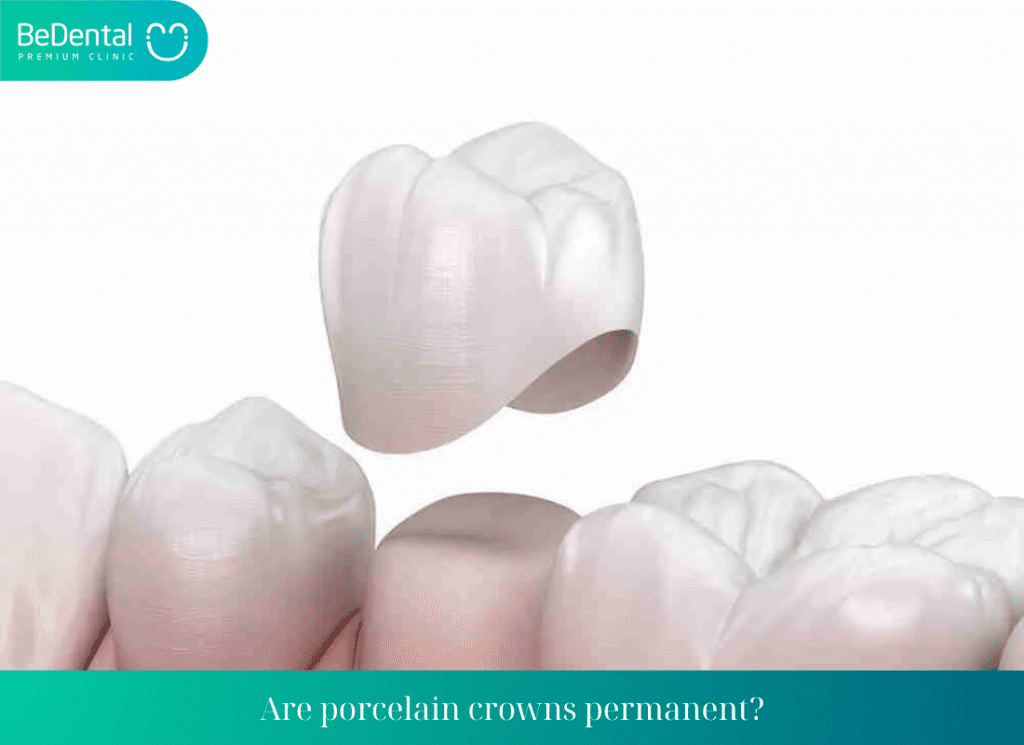
Similar to natural teeth, porcelain teeth will wear out if used. Whether porcelain crowns are permanent depends on proper care. At that point, they can last for many decades, or even permanently.
Metal porcelain crowns have a durability of about 7-10 years, and porcelain crowns have a minimum durability of 15 years.
Post-treatment care for porcelain crowns helps increase tooth longevity
The durability of porcelain crowns depends largely on the post-treatment dental care of each individual. The same type of crowns, but if you take good care of them, their durability will be higher than the average lifespan we listed above.
See more: Signs of gum recession during braces
Good dietary and oral hygiene habits
As mentioned above, the durability of porcelain crowns primarily depends on your daily care and diet.
Since porcelain crowns are quite durable and beautiful, you should avoid eating any crispy, hard, or chewy foods. While porcelain crowns are much stronger than natural teeth, they are still artificial teeth and not firmly attached to the tooth structure like natural teeth.
You need to ensure adequate nutrient intake for your body, pay attention to increasing calcium to strengthen natural teeth. Limit the consumption of carbonated beverages, alcohol, and medications that cause discoloration of porcelain teeth.
Statistics show that many people with a tendency to grind their teeth reduce the longevity of porcelain crowns. Therefore, you need to eliminate this bad habit.
Proper tooth brushing after getting porcelain crowns
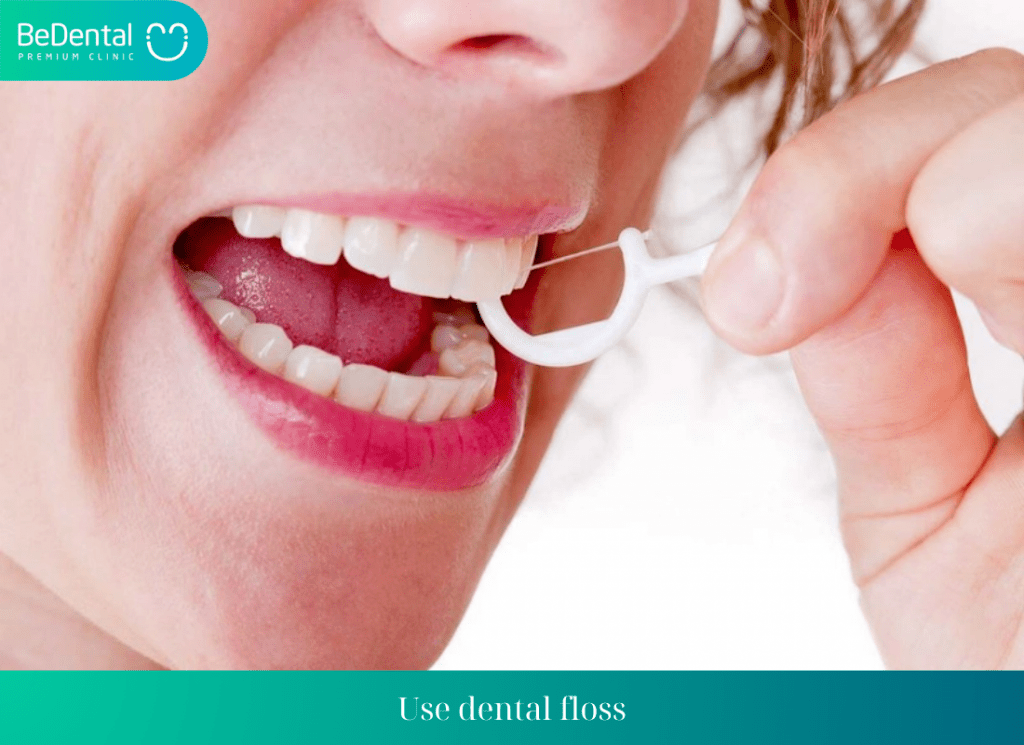
- Brushing your teeth thoroughly 2-3 times a day helps remove food particles, bacteria, and plaque buildup in the oral cavity.
- Use dental floss or mouthwash to prevent food from sticking to and accumulating in the gaps between porcelain teeth, which can damage natural teeth.
- Regularly replace your toothbrush every 3-4 months to avoid creating a breeding ground for bacteria.
Additionally, using fluoride toothpaste helps protect your teeth and prevent the formation of cavities.
Tư vấn chuyên môn bài viết:
BÁC SĨ DƯƠNG THỊ THÙY NGA





